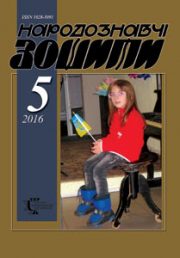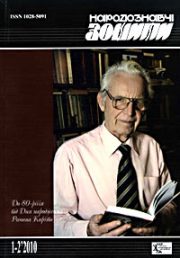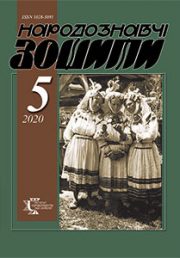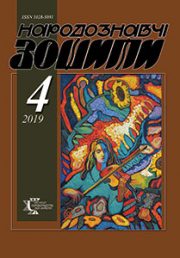The Ethnology Notebooks. 2018, 1 (139), 103–111
UDK 314.151.3-054.72/.73:355.355(470:477)”20”
DOI https://doi.org/10.15407/nz2018.01.103
Received 14.01.2018
BETWEEN TWO WORLDS: ACTUAL LIFE STRATEGIES OF VICTIMS OF MILITARY CONFLICT IN UKRAINE
Ivankova-Stetsyuk Oksana, Doctor of Sciences, acting of the leader of the
departmeny of social anthropology
at the Institute of Ethnology
of the National Academy of Sciences of Ukraine,
Svobody Avenue 15, 79000, Lviv, Ukraine.
Contacts: e-mail: ina@mail.lviv.ua
Markov Igor, candidate of sciences in history,
Ph.D, doctoral student in the Department of social anthropology
at the Institute of Ethnology
of the National Academy of Sciences of Ukraine,
Svobody Avenue 15, 79000, Lviv, Ukraine.
Contacts: e-mail: igor.markow@gmail.com
Abstract. The processes of integration of newcomers into the community of residence — alike, whether the issue of entry of foreign migrants into the community, or internal migrants from one of region to other within country – now, unfortunately, belong to the determinants of social relations. Modern Ukrainian society is at the crossroads of both of these integrations. On the one hand, it is a question of massive external migration of Ukrainians mainly to EU countries, which has grown significantly due to the lack of visible prospects for Ukraine’s domestic development and the continuing Russian-Ukrainian war, and on the other hand, the emergence of over half a million internally displaced people persons from the zone of armed conflict in the Donbass. Through comparative analysis of focus groups with internally displaced persons from territories occupied by Russian forces and previously obtained results of field studies of labor migrants from Ukraine to the EU, the authors of the article consider the challenges and models of integration of local groups into the dominant societies.
Keywords: internally displaced persons, external migrants, local groups, dominant socium, integration models.
REFERENCES
Bevzenko, L. (2017). Peredmova. Liudyna u skladnomu sviti. Sumy: Universytets’ka knyha, pp. 7–16.
Vasil’eva, E.N. (2008). Tipologija «cerkov’-sekta» Vebera-Trjol’cha i ee razvitie v zapadnom i otechestvennom religiovedenii: avtoref. dis. na soiskanie nauk. stepeni kand. fіlosof. nauk: 09.00.13 «Filosofija i istorija religii, filosofskaja antropologija, filosofija kul’tury». Moskva.
Dennis, K. Arri, Dzh. (2010). Pislia avtomobilizmu. Kyiv: Tempora.
Ivankova-Stetsiuk, O., Seleschuk H. (Eds.). (2016). Dolaiuchy rozlomy: u poshuku vidpovidej na vyklyky intehratsii poterpilykh vid zbrojnoho konfliktu (analitychni zapysky na poliakh). Karitas Ukrainy. Stryj: Vydavnychyj dim «Ukrpol».
Ivankova-Stetsiuk, O., Seleschuk, H., Susak, V. (2011). Vyklyky ta adaptatsijni rezervy polilokal’nykh rodyn ukrains’kykh trudovykh mihrantiv. L’viv: Instytut rehional’nykh doslidzhen’ NAN Ukrainy; Komisiia UHKTs u spravakh mihrantiv.
Kutsenko, O. (2008). Do sotsiietal’noi intehratsii chy do rozvytku «paralel’nykh sus-pil’stv»? (Porivnial’ne vyvchennia etnichnykh vzaiemodij). Sotsiolohiia: teoriia, metody, marketynh. № 1, pp. 140–165.
Markov, I. (Ed.). (2009). Na rozdorizhzhi. Analitychni materialy kompleksnoho doslidzhennia protsesiv ukrains’koi trudovoi mihratsii (krainy Yevropejs’koho Soiuzu ta Rosijs’ka Federatsiia). L’viv: Papuha.
Berry, J.W. (2005). Acculturation: Living successfully in two cultures. International Journal of Intercultural Relations. № 29. Pp. 697–712.
Brain-Net Circular Migration (2010). Vol. 1. «Migrants Flows Feeding into Business Internationalization». Rome: Rubbettino. Pp. 159–199.
Markov, I., Odynets, S., Sudyn, D. (2017). Ukraine and Temporary Migration in the Euro-Asian Transnational Space. Pitkänen P., Korpela M., Aksakal M., Schmidt K. Characteristics of Temporary Migration in European-Asian Transnational Social Spaces. Berlin: Springer, pp. 161–175.
Pitkänen P., Korpela, M., Aksakal, M. (Eds). (2017). Characteristics of Temporary Migration in European-Asian Transnational Social Spaces. Berlin: Springer.
Zymmel’, H. Bol’shye horoda y dukhovnaia zhyzn’. URL: http:/www.magazines.russ.ru/logos/202/3/zim.html.
Nyrhinen, M. Migration, is that an ever unclear concept? URL: http://www.metropolis2013.fi/index.php/blog2 . (Accessed 2013).







